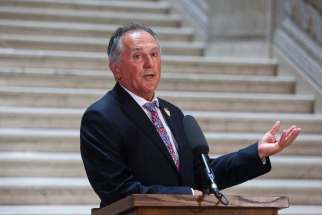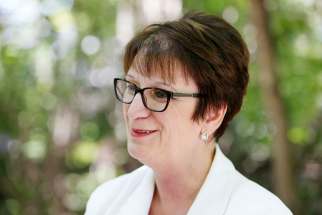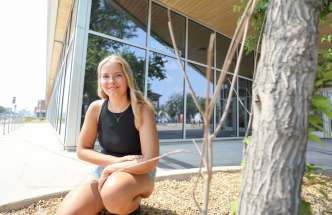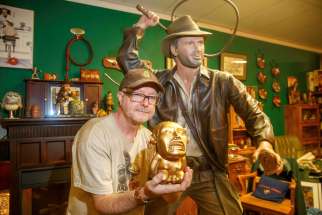Reconciliation requires leadership, not revisionist history
Read this article for free:
or
Already have an account? Log in here »
To continue reading, please subscribe:
Monthly Digital Subscription
$0 for the first 4 weeks*
- Enjoy unlimited reading on winnipegfreepress.com
- Read the E-Edition, our digital replica newspaper
- Access News Break, our award-winning app
- Play interactive puzzles
*No charge for 4 weeks then price increases to the regular rate of $19.00 plus GST every four weeks. Offer available to new and qualified returning subscribers only. Cancel any time.
Monthly Digital Subscription
$4.75/week*
- Enjoy unlimited reading on winnipegfreepress.com
- Read the E-Edition, our digital replica newspaper
- Access News Break, our award-winning app
- Play interactive puzzles
*Billed as $19 plus GST every four weeks. Cancel any time.
To continue reading, please subscribe:
Add Free Press access to your Brandon Sun subscription for only an additional
$1 for the first 4 weeks*
*Your next subscription payment will increase by $1.00 and you will be charged $16.99 plus GST for four weeks. After four weeks, your payment will increase to $23.99 plus GST every four weeks.
Read unlimited articles for free today:
or
Already have an account? Log in here »
Hey there, time traveller!
This article was published 15/07/2021 (1608 days ago), so information in it may no longer be current.
It’s a simple question: did newcomers to Canada and their elected governments attempt to destroy the lives, livelihoods, culture and identities of Indigenous people when they settled the country?
The answer is straightforward, based on incontrovertible historical evidence. Yet Premier Brian Pallister and his new minister in charge of Indigenous affairs are having great difficulty answering it.
Last week, Pallister said settlers who came here before Confederation and in its early days came simply to build better lives for themselves and left no destruction in their wake.
“The people who came here to this country, before it was a country, and since, didn’t come here to destroy anything, they came here to build,” he said.
His comments contradict well-documented policies and actions of the federal government and others who systematically displaced Indigenous people and attempted to extinguish them as a people.
Settlers didn’t just come to Canada to build farms, communities and churches, as Pallister claims. That’s the fairy tale version of Canada. They exploited the people who lived here and prospered at their expense.
Pallister either doesn’t understand that or refuses to believe it.
He was asked again about his comments Wednesday, after former Indigenous affairs minister Eileen Clarke bolted from cabinet. Instead of reflecting on his comments and correcting them, Pallister doubled down and said he stands by what he said.
He defended them again Thursday, suggesting his comments were misunderstood.
“I paid tribute to pre-Canada builders,” said Pallister. “I did not reference colonialism.”
It’s unclear whether Pallister even understands what colonialism means.
He has his own set of alternative facts on how Canada was built.
His new Indigenous reconciliation and northern relations minister, Alan Lagimodiere, doesn’t appear to have a better grasp of Canadian history than his boss does.
During a scrum at the legislature minutes after he was sworn into cabinet, Lagimodiere fumbled questions so badly about colonialism and residential schools, he issued a statement later in the afternoon saying he “misspoke.”
Most of his responses were gibberish, including a bizarre statement that the public needs to “decode” what politicians, including the premier, say to fully understand them.
“I believe that (Pallister) was trying to tell everybody that, everybody that came to Canada was trying to work together for a better Canada,” said Lagimodiere, who is Métis.
It was an odd statement, considering Lagimodiere’s own ancestors were the victims of violent oppression, including murder, immediately after Manitoba joined Canada in what some newspapers at the time dubbed “the reign of terror” against the Métis. It was hardly an example of all Canadians “trying to work together for a better Canada.”
At one point during the scrum, Lagimodiere said residential schools were established to give Indigenous children skills to fit into society.
“They thought they were doing the right thing. In retrospect, it’s easy to judge,” said Lagimodiere.
When pressed, he acknowledged residential schools were designed to assimilate Indigenous children into non-Indigenous society. In a statement that followed, he said residential schools “were wrong then and they are wrong now.”
The question is, how deep does colonialism denial run in Manitoba’s Progressive Conservative party? At a time when Canada is reevaluating the foundation upon which it was built, including who benefited from Confederation and at whose expense (and what impact it has on society today), Manitoba has a government — or at least a premier — who continues to cling to the fairy tale version of Canadian history. It also has a new minister of Indigenous reconciliation and northern relations who, at best, is conflicted about his views on colonialism and residential schools.
It’s unlikely this party can survive the next election without wholesale change at the top, including the selection of a new leader who has the intellectual capacity to participate in Canada’s reconciliation process. Pallister clearly does not.
tom.brodbeck@freepress.mb.ca

Tom has been covering Manitoba politics since the early 1990s and joined the Winnipeg Free Press news team in 2019.
Our newsroom depends on a growing audience of readers to power our journalism. If you are not a paid reader, please consider becoming a subscriber.
Our newsroom depends on its audience of readers to power our journalism. Thank you for your support.













